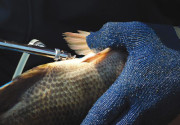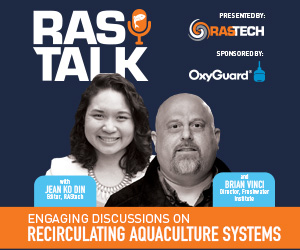| |
| |
 |
 |
| |
 |
|
@{mv_date_MMM d, yyyy}@ |
|
| |
 Oyster farmers in the US east coast may soon be able to buy seed oyster “on the go” – thanks to funding granted by the US Department of Agriculture to a Virginia-based independent shellfish hatchery that’s developing a mobile oyster hatchery prototype.
» Read more
Oyster farmers in the US east coast may soon be able to buy seed oyster “on the go” – thanks to funding granted by the US Department of Agriculture to a Virginia-based independent shellfish hatchery that’s developing a mobile oyster hatchery prototype.
» Read more
Mahi-mahi spawns rapidly and grows extremely fast, however, the problem is that with rapid growth comes rapid sexual maturation. This presents significant challenges. An R&D underway aims to address this issue, and to make culturing the species economically viable.
» Read more
While lobster fishing is creating a mono-cultural economy in coastal Maine, Atlantic Sea Farms offers opportunities for lobster fishermen to expand their off-season business into growing sustainable kelp. Atlantic Sea Farms CEO Briana Warner shares her expertise.
» Read more
|
| |
 |
 |
| |
|
| |

Intensive tilapia co-culture is the commercial production of various species of tilapia in conjunction with one or more other marketable species. Tilapia are attractive as a co-cultured fish because of their potential to improve water quality, especially in penaeid shrimp ponds, by consuming plankton and detritus and by altering pathogenic bacterial populations while increasing marketable production.
Tilapia in Intensive Co-Culture is the latest book in the prestigious World Aquaculture Society (WAS) Series. It will be of great use and interest to researchers, producers, investors and policy makers considering tilapia co-culture in terms of environmental and economic sustainability.
» Learn more |
| |
|
| |
 Optimizing fish husbandry practices and minimizing stress, instituting biosecurity protocols, and actively monitoring the health status of one’s livestock, enable fish farmers and their veterinarians to significantly improve the health and productivity of their fish. As the adage goes, “an ounce of prevention is worth a pound of cure.”
» Read more
Optimizing fish husbandry practices and minimizing stress, instituting biosecurity protocols, and actively monitoring the health status of one’s livestock, enable fish farmers and their veterinarians to significantly improve the health and productivity of their fish. As the adage goes, “an ounce of prevention is worth a pound of cure.”
» Read more |
| |
| NET PENS & OFFSHORE AQUACULTURE |
|
|
| |
Coastal marine aquaculture is reaching its growth limits, but don’t expect offshore aquaculture to pick up the slack and accelerate in the near term, says Rabobank.
» Read more
|
|
As part of an industry-wide effort to make aquaculture as environmentally sustainable as possible, the AKVA Group of Norway says it will produce entire net pens using recycled plastics, an initiative meant to also prove the point that such recycled materials meet quality standards.
» Read more
| | |
|
| |

|
| |
|
| |

August 15 - August 18, 2022
St. John’s, Newfoundland
» Learn more
September 7 - September 8, 2022
Portland, Maine
» Learn more
September 08, 2022
Virtual Event, Aquaculture North America
» Learn more
|
| |
| |









